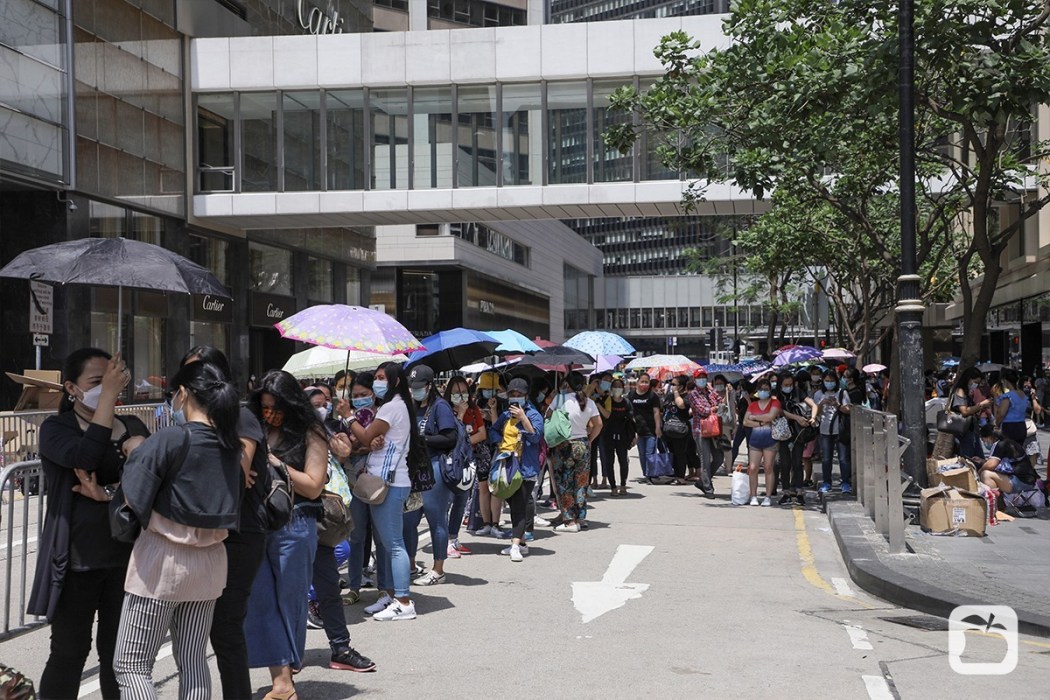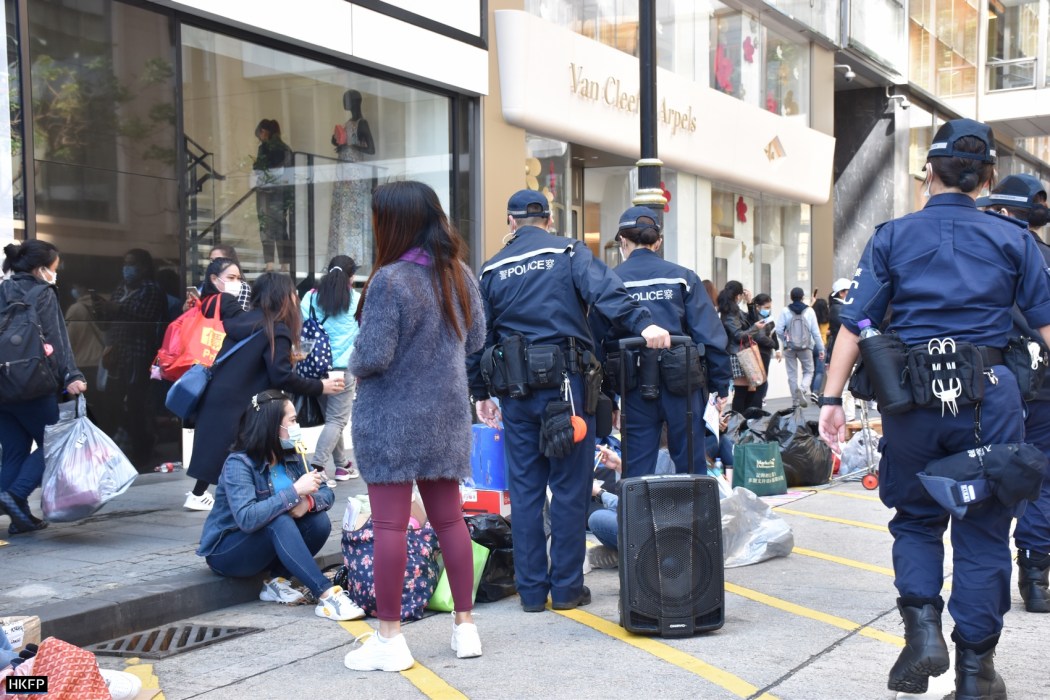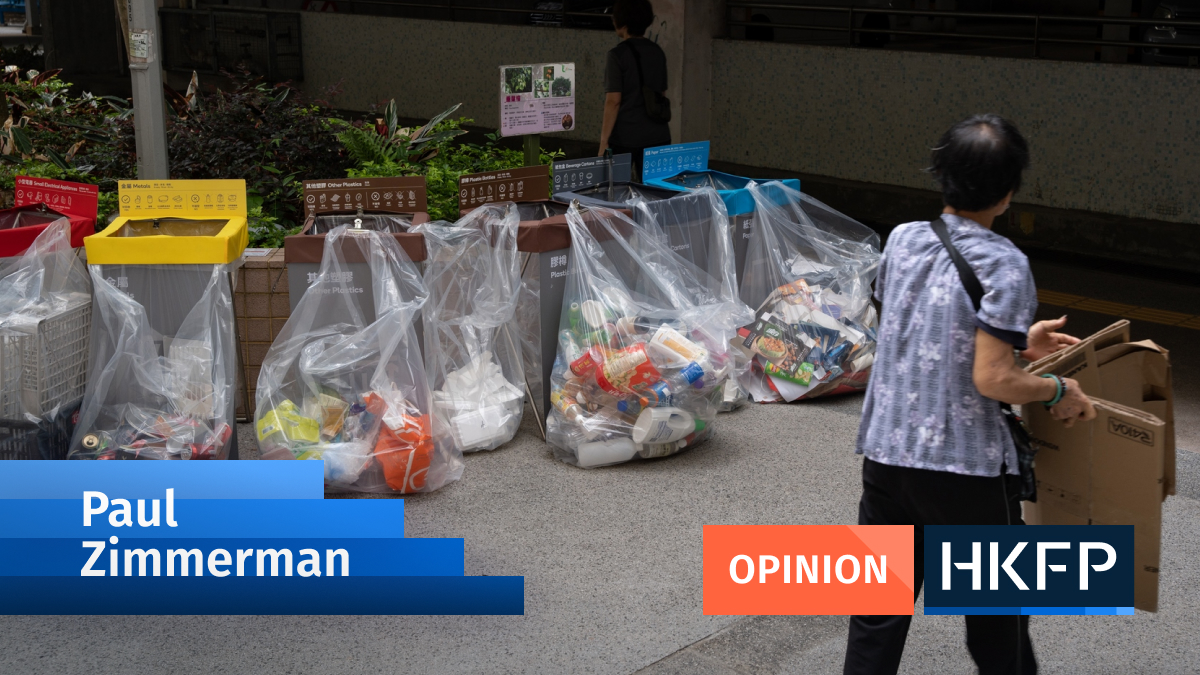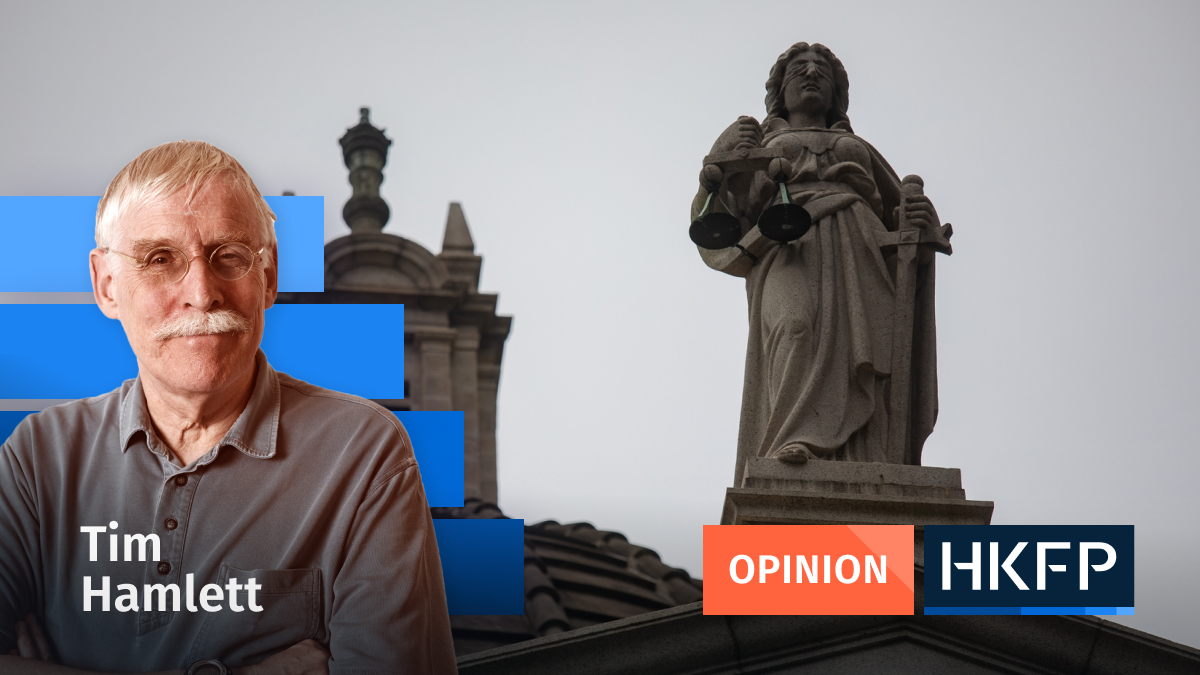Last week, the Hong Kong government ordered the city’s 370,000 migrant domestic workers to undergo mandatory Covid-19 tests after a worker with no recent travel history contracted the virus locally.
In addition to the compulsory tests that resulted in workers lining up under the sun for over five hours on Labour Day, migrant domestic workers who want to renew their contract and remain in Hong Kong must receive Covid-19 vaccinations.

Migrant domestic workers are the only groups that are subjugated to treatment that forces them to choose between physical autonomy and a stable economic future. Migrant workers and advocates decried the government’s latest mandates as “stigmatising and discriminating.” The government’s Covid-19 policies, in fact, have long been motivated by racist stereotypes that further marginalize migrant domestic workers and working-class South Asian communities. Racialised discourse and bias against these communities existed prior to the pandemic. They are magnified when the government implements public health policies that privilege mainstream Hongkongers and white expats over other racial groups.
During the pandemic, public discourse and government policies surrounding risk cannot be separated from race and class. While seemingly scientific, the calculation of risk has long been infected with negative stereotypes and assumptions about certain races. Migrant domestic workers are not the only group to be deemed high risk after only just one positive case. In January, Hong Kong public health official Raymond Ho suggested that South Asian ethnic minorities were high risk because of their cultural practices and ethnicity.
Ho said: “They have many family gatherings and like to gather with fellow countrymen. They like to share food, smoke, drink alcohol and chat together… They also need to share sanitary facilities with neighbours if the living environment is crowded.” Popular media outlet Apple Daily amplified this racist discourse by marking South Asians as culprits responsible for Covid-19 transmission.

The government used a similar narrative to justify the latest mandates against migrant domestic workers, claiming that they were high risk because they “often have gatherings with their friends during their days off”.
It is important to note that local mainstream Hongkongers and white expats frequently engage in similar social activities. In fact, many white expats have been gathering in crowds without masks, leading to several outbreaks in bars, gyms, and prestigious international schools. Wealthy Hongkongers were responsible for an outbreak in the city’s ballroom dancing scene and upscale restaurants. Despite these outbreaks, the Western expat community and wealthy mainstream Hongkongers were not represented by the government as disease vectors — unlike the South Asian and migrant domestic worker communities. The perception of risk, in other words, is intimately tied to Hong Kong’s racial and socioeconomic hierarchies.
Furthermore, the government weaponizes the living conditions of working-class South Asians and migrant domestic workers to justify discriminatory public health policies. Due to systemic racism, working-class South Asians tend to live in sub-divided flats with a shared bathroom; because of restrictive labour policies, migrant domestic workers have no choice but to gather in public with their peers on their only day off (if they are lucky) of the week. These precarious conditions are created by ongoing economic inequities and racism. Rather than addressing the root causes, the government instead turned the communities’ plights against them. Working-class racial ethnic minorities are already more negatively impacted by Covid-19 because of their working and living conditions. Rather than offering targeted support, the government’s policies further entrench existing inequities.

The racialisation of Covid-19 risks has material ramifications on the lives of marginalized communities. Many migrant domestic workers, for instance, have been fined for violating social distancing policies on their days off. For migrant domestic workers who make HK$ 4,630 a month, the fixed fine of HK$2,000 could take a significant financial toll. Meanwhile, the authorities rarely penalises mainstream local Hongkongers and white expats who socialise without masks in crowded places like bars, dance clubs, and shopping malls. It was not until severe outbreaks occurred in expat communities that the government implemented lockdowns and quarantines for this demographic.
When the government started implementing “pop-up” lockdowns in January 2021, they targeted working-class neighbourhoods, such as Yau Tsim Mong, that were populated by marginalised ethnic minorities. Residents were not informed about the abrupt 48-hour lockdown, in part due to language barriers. Unlike wealthy Hongkongers and expats who have sufficient financial resources, working-class South Asian communities could not all afford to miss work. Muslim residents in that district had also complained that they were given pork products by the government, which they could not consume. At the end of the lockdown, only 13 out of 7,000 people were tested positive for Covid-19.
The outbreaks among wealthy Hong Kong socialites and expats, on the other hand, amounted respectively to over 500 and 60 cases. Similarly, after testing 54,000 samples collected from migrant domestic workers over the first weekend of May, no new Covid-19 cases were found. These numbers demonstrate that the government’s Covid-19 control policies were grounded less in science and statistics than in racism and classism.

The scapegoating of marginalized racial minorities is possible because of deeply ingrained racist beliefs. Long before Covid-19, South Asians and migrant domestic workers have been associated with racist stereotypes that represent them as less hygienic and health minded than others in Hong Kong.
On the one hand, the Hong Kong society relies heavily on the labour of both groups, but on the other, their interests and voices are rarely taken into consideration. Seen this way, the Hong Kong government’s racist Covid-19 policies are but a symptom of a larger systemic issue we must confront. The first step is to follow and support advocacy groups such as the Asian Migrants’ Coordinating Body, Justice Centre, and Hong Kong Unison in our collective fight against racism and marginalisation.
Support HKFP | Policies & Ethics | Error/typo? | Contact Us | Newsletter | Transparency & Annual Report | Apps
Help safeguard press freedom & keep HKFP free for all readers by supporting our team
| HKFP is an impartial platform & does not necessarily share the views of opinion writers or advertisers. HKFP presents a diversity of views & regularly invites figures across the political spectrum to write for us. Press freedom is guaranteed under the Basic Law, security law, Bill of Rights and Chinese constitution. Opinion pieces aim to point out errors or defects in the government, law or policies, or aim to suggest ideas or alterations via legal means without an intention of hatred, discontent or hostility against the authorities or other communities. |

More HKFP OPINION:
HKFP has an impartial stance, transparent funding, and balanced coverage guided by an Ethics Code and Corrections Policy.
Support press freedom & help us surpass 1,000 monthly Patrons: 100% independent, governed by an ethics code & not-for-profit.










